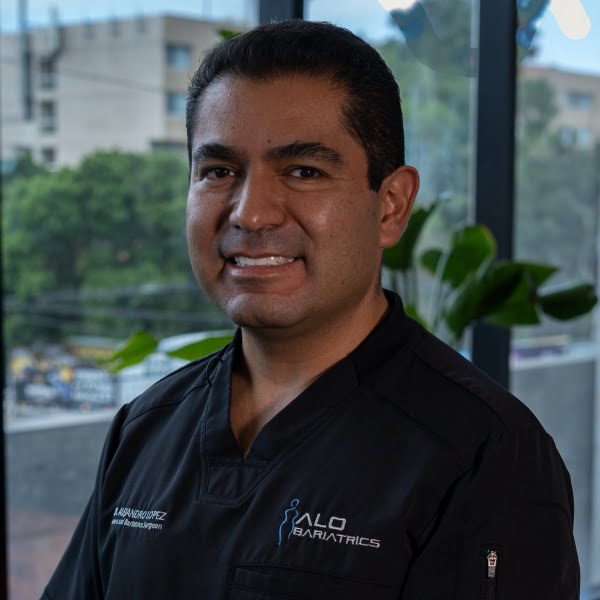Repairing a Hiatal Hernia During Bariatric Surgery
Do you have heartburn, indigestion, or other symptoms of gastroesophageal reflux disease (GERD)? If you do, it could be caused by a hiatal hernia that may need to be repaired through surgery.
Many patients who are overweight or obese also have what is called a hiatal hernia. If you’re seriously considering a weight loss procedure, you may be wondering if you’ll be able to undergo the surgery if you already have an existing hernia. Fortunately, hiatal hernias can be fixed at the same time as bariatric surgery. One benefit to having a hiatal hernia repaired during bariatric surgery is preventing the patient from having to go under general anesthesia twice and can reduce complications after surgery.
If you’re having bariatric surgery and have been suffering from a hiatal hernia or symptoms of GERD, ask your surgeon if you can have bariatric surgery with a hiatal hernia.
Concurrent Repair of a Hiatal Hernia with Bariatric Surgery
Repairing a hiatal hernia can be completed at the same time as your bariatric surgery, which can lead to fewer complications. If a surgeon finds a hiatal hernia during bariatric surgery, they will fix it as long as it is safe to do so. Since hiatal hernias are common in overweight patients, it’s a frequent operation performed safely by surgeons at ALO Bariatrics.
What is a Hiatal Hernia?
A hiatal hernia happens when portions of the abdominal cavity push through an opening at the top of the diaphragm. Hiatal hernias are classified as either “sliding” or “paraesophageal.” Sliding-type hernias account for 85-90% of hiatal hernias and can cause GERD. Paraesophageal hiatal hernias can become a medical emergency if it becomes strangulated and can cause back pain and shortness of breath. Both types of hernia can be fixed using surgery.
Typically, people don’t know they have a hiatal hernia unless they develop certain side effects. The most common side effect of a hiatal hernia is pain and discomfort from gastroesophageal reflux disease (GERD). Other symptoms associated with hiatal hernia are heartburn, acid reflux, difficulty swallowing, and chest pain.
Diagnosing a hiatal hernia can be difficult due to the fact the hernia can slide in and back out of the diaphragm depending on the position of the patient and their breathing pattern. One of the most common ways to see if a patient has a hiatal hernia is through a test called barium swallow radiography. With this test, the patient swallows a small amount of radiographic solution that can be easily seen with imaging. The provider can then see the location and the size of the hiatal hernia in a patient.
Causes of Hiatal Hernias
Hiatal hernias are mainly caused by increased abdominal pressure from being overweight or obese. Patients who are severely obese have a three to four times higher amount of pressure in their abdomen pushing up on the diaphragm. The heavier a person is, the more likely they are to have or develop a hiatal hernia.
Other major causes are trauma and birth defects, multiple pregnancies, and a history of surgeries that involve the esophagus. Another potential risk factor is having a partial or full gastrectomy with a surgeon who doesn’t take all precautionary steps to minimize complications.
The Relationship Between Hiatal Hernias and Obesity
There is a direct relationship between obesity and the development of hiatal hernias. The more a person weighs, the higher the risk of developing this type of hernia. Up to 50% of patients who classify as severely obese have a hiatal hernia, whether they know it yet or not.
Fortunately, experienced surgeons like those at ALO Bariatrics can fix the hiatal hernia while performing bariatric surgery. If you don’t have your hiatal hernia fixed during surgery and it causes you complications down the road, you’ll have to have another surgery.
Hiatal Hernia Repair During Bariatric Surgery
During your bariatric surgery, if a hiatal hernia is discovered, your surgeon will likely repair the hernia if it’s safe. This can be beneficial in a few ways. Firstly, your surgeon can strengthen the weak abdominal cavity structures that led to hernia in the first place. Secondly, patients who have bariatric surgery can expect to lose up to 80% of their excess weight. Losing a large amount of weight will help reduce pressure in the abdomen, decreasing the risk of redeveloping a hiatal hernia. The combination of reinforced structures in the diaphragm and lower abdominal pressure significantly decreases your risk of developing a hiatal hernia.
Benefits of Hiatal Hernia Repair During Bariatric Surgery
There are many benefits to having your hiatal hernia repaired at the same time as your gastric bypass or sleeve gastrectomy. If you were to have these procedures done separately, you would have to undergo general anesthesia twice, which carries risks of complications. Having to have a second major surgery to repair a hiatal hernia can be expensive and dangerous. After your hiatal hernia is repaired, you’ll experience fewer to no symptoms of GERD, and the opening to your diaphragm will be stronger, leading to a lower likelihood of developing complications throughout your recovery.
Having a hiatal hernia repair during your bariatric surgery can also lower your risk of complications. Specifically, fixing a hiatal hernia with both the gastric bypass or gastric sleeve procedure will decrease your chances of developing GERD. This will help your recovery from bariatric surgery and alleviate symptoms of GERD after eating.
How Common is it for Hiatal Hernias to be Repaired During Bariatric Surgery?
There isn’t one best bariatric surgery for a hiatal hernia. However, it’s common for these to be repaired during bariatric surgery so long as your surgeon determines it’s safe for you. The surgeons at ALO Bariatrics want to minimize every risk possible of complications after your surgery, and fixing a hiatal hernia is one way of improving your outcomes. Ask our experts at ALO Bariatrics if having your hiatal hernia repaired during your bariatric surgery is the right choice for you.
Hiatal Hernias After Gastric Bypass Surgery
Hiatal hernias can be a rare complication after gastric bypass surgery, and your risk of developing a hiatal hernia is significantly lower. If a hiatal hernia does develop, it is more likely to be seen in patients who received a gastric sleeve procedure. GERD can also be a complication of bariatric surgery, with or without the presence of a hiatal hernia. If you’ve had bariatric surgery and have developed GERD or your GERD has worsened, you should consult with a healthcare provider to determine if you have a hiatal hernia.
For those considering bariatric surgery and concerned about a hiatal hernia, speak with a surgeon from ALO Bariatrics about how a gastric bypass procedure done in the right hands, and with the right preventative techniques, can help minimize the risk of developing a hiatal hernia.
Seek A Professional Medical Opinion at ALO Bariatrics
Board-certified surgeons at ALO Bariatrics have performed thousands of hiatal hernia repairs during bariatric procedures. If you’re concerned about a hiatal hernia after a gastric bypass or sleeve gastrectomy, speak with a surgeon today about your options to prevent this complication. The right surgery done by the right hands will minimize any chance of complication and lead to a speedy recovery.
There’s a reason ALO Bariatrics is considered the premier destination in Mexico for bariatric surgery. Find out why today.


Dr. Alejandro Lopez, the owner and lead bariatric surgeon at ALO Bariatrics, is a Fellow at the American College of Surgeons and is accredited with the American Society for Metabolic and Bariatric Surgery. He is also a certified bariatric surgeon by the Mexican College of Surgery for Obesity and Metabolic Diseases. He is one of two surgeons in Tijuana and one out of five to ten in all of Mexico who is able to provide robotic surgery.


